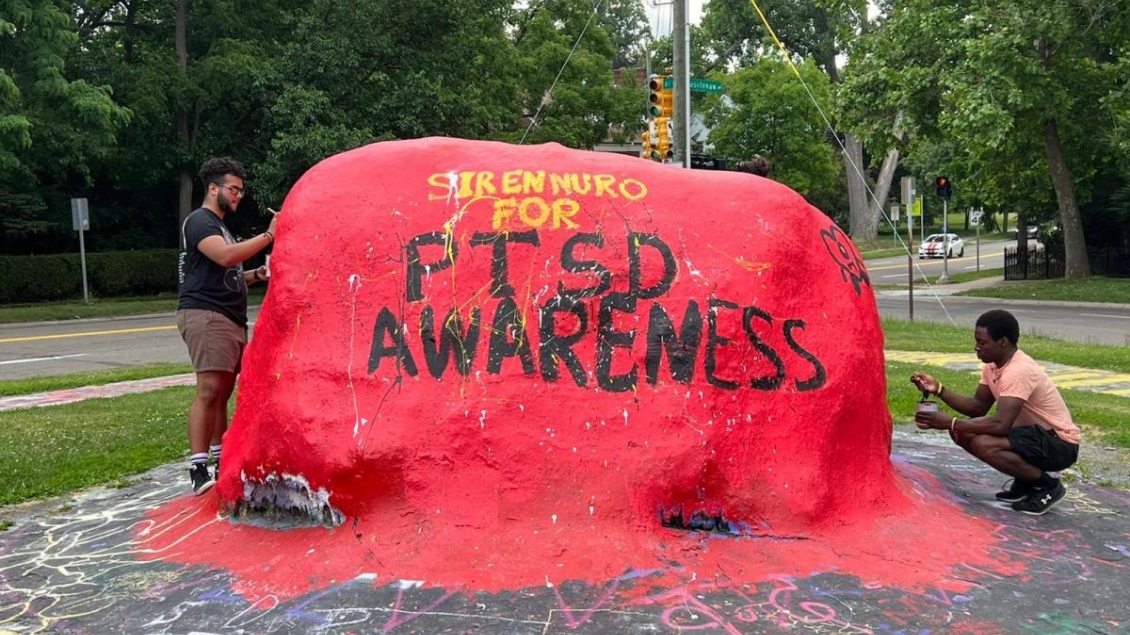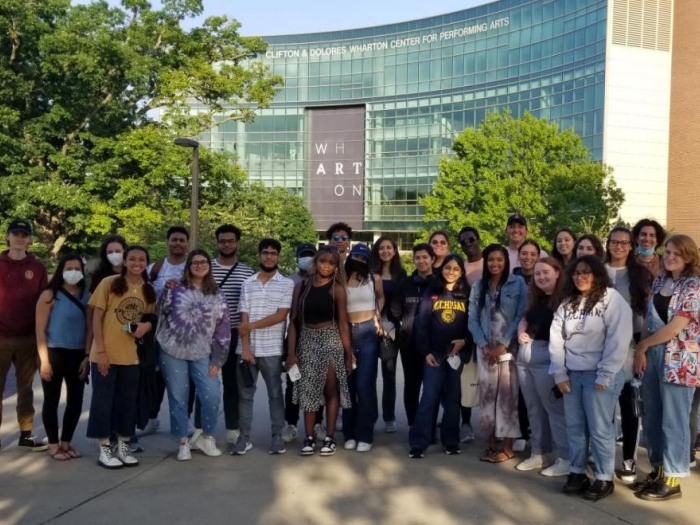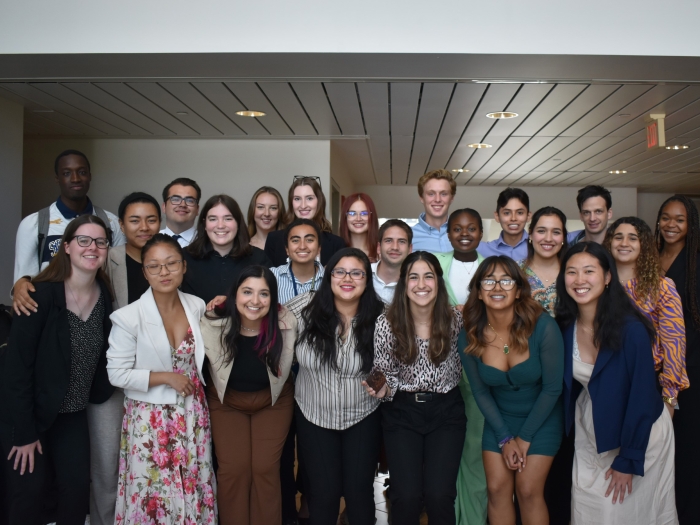
Expand Your Knowledge
The Neuroscience Graduate Program offers two different summer research opportunities.
The NGP Summer Research Opportunities include two programs:
SIREN: The NSF-funded Summer Intensive Research Experience in Neuroscience
NURO: The NIH-funded Neuroscience Undergraduate Research Opportunity
Both programs include a 10-week full-time (40 hr/week) research experience during the summer, May 25 to Aug 2, 2025. Participants will engage in research with one of our participating faculty as well as weekly professional development workshops and an innovative communications course using theater tools from applied improvisation. Social opportunities abound as summer in Ann Arbor is an extraordinary experience.
NURO extends this summer experience by enabling continued paid part-time research in the same laboratory during the next academic year along with monthly professional development. As such, NURO participants must come from regional institutions within a short drive (<60 min).
Applicants for both programs must be U.S. citizens or permanent residents, non-UM Ann Arbor students, and over 18 years of age. They must have completed 1 year of college by May 2025 and must not graduate with a terminal 4-year degree before December 2025. Both programs seek to offer research experiences to those with limited research experience and/or those from institutions with limited access to neuroscience research opportunities, and both encourage applications from students that contribute to the rich diversity of our community who have a commitment to creating an inclusive environment.

NURO is designed for students from Southeastern Michigan who have completed at least one year of undergraduate education and are looking to gain experience in a neuroscience laboratory in an extended opportunity full-time in summer and part-time in the academic year.

SIREN is designed for students who have completed at least one year of undergraduate education at an institution with limited, if any, opportunities to gain research experience.
What are the distinctions between SIREN and NURO?
SIREN seeks to attract students from across the country interested in exploring neuroscience research for a 10-week full-time summer experience. NURO includes the same 10-week summer experience but extends this to include part-time work through the next academic year, thus it targets students from the Ann Arbor region. Both programs seek to attract students with limited prior experience and/or those from institutions with limited research resources. We encourage applications from underrepresented students and their allies.
How competitive are these programs?
Typically, we receive 200-400 applications for 20 total spots.
What is the application, review, and onboarding sequence?
While the exact dates change each year, the general sequence includes:
- Dec-Jan: Application window
- Jan-Feb: Admissions committee review.
- Mar-Apr: Offers made and mentors are matched with selected applications. All applicants are notified of review outcomes after all positions are filled.
- May: Pre-boarding virtual meetings, online training, and mentors and mentees complete the Mentoring Agreement forms and meet virtually.
What financial support is provided?
Stipends (>$6,000 per summer plus $15/hr for up to 200 additional hours during the academic year for NURO participants), summer housing, and travel funds are provided. A modest food allowance is also provided during summer along with numerous meals at workshops and social events.
What types of professional development activities are scheduled? Are these required?
Each summer week, there are 2 or 3 professional development events. All are required. NURO and SIREN combine for some. Topics focus on personal growth, academic skills, and career development. Some workshop topics include:
- Personal Narratives and Mission Statements
- Social Identities and Imposter Phenomenon
- Critical Analysis and Journal Clubs
- Methods in Neuroscience and Ethics, Rigor, and Reproducibility
- Effective Scientific Presentations
- Meet the Scientist Sessions
- Preparing for Graduate School
- Preparing a NSF Graduate Research Fellowship Program application
In addition to these, participants meet each week for Applied Improvisation training and science communication practice.
What types of social activities are scheduled?
Past group events include picnics, movie and game nights, trips to Detroit, connections with NGP Community Groups for soccer or hiking, and group attendance at various Ann Arbor summer festivals. Weekly emails highlight numerous other opportunities around town.
What is Applied Improvisation training like? Do I have to participate?
Applied improvisation is the use of theatrical improvisation tools to practice and explore concepts relevant to science communication and collaboration. Weekly sessions are led by improv professionals connected to the NGP, who will lead several games around a central theme each week. All attendees must participate. Though participants can approach with some fear and trepidation, all eventually point to this activity as a highlight of the summer and a valuable series for building their communication skills.
Is there any flexibility in the program dates? My school ends after the program start, or starts before the program ends.
No. You must be available for the full program duration, start to finish. We are unable to shift start/end dates or alter the program sequence in any way.
Can I be excused for a week or several days during the summer program for vacation, etc.?
No. All vacations should be taken before program start or after program end. You will not be excused from the program for vacation days, even if the mentor laboratory okays your absence.
Can I work another job or take classes at U-M or through my home institution during the summer program?
No. You are not allowed to moonlight, work another job, or take classes during the summer program.
What accommodations are in place for those with physical or learning disabilities?
We adhere to ADA requirements and will accommodate physical and/or learning disabilities according to UM policy. Determination of appropriate accommodations will be made in association with the UM ADA coordinator and the Office of Services for Students with Disabilities. Declaration of need for accommodations should be made after accepting the offer of admission, at least 2 weeks prior to program start. Interpreter services will be provided for deaf and hard of hearing students during large social gatherings, large professional development events, and the final symposium.
Where will I live while at the University of Michigan?
On-campus housing is provided for the full ten week summer program. Housing may be in dorm-style residences or apartment-style units. Accommodations vary in size but are furnished. Special needs can be accommodated upon notification. Shared or within-unit kitchens are available.
Will I have a roommate?
Currently students may share a bathroom with one other participant but all students have their own room.
What kind of academic background is required?
Successful applicants typically have a strong background in STEM fields relevant to neuroscience. While formal neuroscience coursework is a plus, this is not required. Reviewers will look to your personal statements to understand your motives to pursue research in this area.
Is there a minimum GPA requirement?
There is no minimum GPA requirement. You may wish to explain poor performance or particularly challenging coursework, but this is not required.
What are the eligibility requirements?
Applicants must be US citizens or permanent residents, must have completed one year toward an undergraduate degree by program start date, and must be available for the duration of the summer program, start to finish. Applicants cannot be current University of Michigan-Ann Arbor students and must not receive their bachelor’s degree prior to program start.
What are you looking for in the personal and research statements?
Overall, reviewers want to get a sense of who you are, why you are interested in a long-term research career, why you are interested in neuroscience particularly, and what skills and experiences make you a successful participant. Both statements should follow an essay format.
Research statement: highlight your motivation to pursue research, your past research experiences, and how those experiences have shaped your understanding and goals. When describing your past research experiences, note the context, significance and hypothesis, not just a list of lab skills. If you do not have research experience in a lab, speak to your motivation and consider describing meaningful experiences in lab courses.
Personal statement: What experiences and/or challenges have influenced your personal and academic growth? How do these align with your long-term goal of a research career? Consider how you might describe yourself in 5-6 adjectives and then make sure your personal statement conveys those attributes. How would these attributes contribute to a research setting and fit in our programs specifically?
What are you looking for in the recommendation letters?
We want two references, ideally from professors or mentors, with at least one from your home institution. References should be able to provide some insight into what type of student you are and what potential you have for a long-term research career.
Do some application factors weigh more heavily than others?
Our review is holistic. We take into account applicant experiences, qualities, identities and academic performance. We also consider how the applicant will contribute to the program, social community and learning environment.
How are students evaluated, ranked, and chosen?
Every application is thoroughly evaluated and scored by a selection committee using a holistic review process. Applicants are ranked by average score, however offers are extended based on many factors. In addition to high scores during review, program directors seek to create cohorts from diverse social demographics, research interests, and geographical locations.
What qualities are reviewers looking for in program applicants?
Reviewers evaluate applicants based on their motivation to pursue a long-term research career in neuroscience, preparation for engaging in all aspects of the summer program, evidence of support for our diversity goals, and desire to develop communication skills.
Will I be contacted about admissions decisions?
Yes. We will notify all students of the outcome. If you are facing deadlines from other programs and SIREN-NURO remains at the top of your interest list, please reach out to directors.
Who are the potential research mentors?
The NGP includes over 150 faculty across many departments and subdisciplines. Participation as potential research mentors depends on travel plans, space, commitment to other programs and students, and funding for the project. Typically, we identify 40 potential mentors each summer, but the composition changes each year.
Should I contact potential mentors on my own?
No. This can lead to considerable confusion. You are welcome to indicate specific NGP faculty in your application, but we are unable to provide a list of mentors for a given summer or a mechanism for you to select your mentor. Reach out to program directors if there are established collaborations between NGP faculty and mentors in your home department.
What is the mentor selection process?
Once faculty mentors are identified and program participants are selected, the program directors make tentative matches based on student interests, research topics, and methodologies. Mentors are given your application and acknowledge a good fit. Then, each of you completes a Mentoring Agreement: mentors note lab policy, training requirements, and project milestones while mentees describe learning styles, mentoring goals, and work preferences. Switches are rarely requested but are allowed if other laboratories are available.
What training will I need to complete?
Before the program starts, students complete online training courses on research integrity, laboratory safety and other lab-specific modules. Mentors will also discuss project details and provide background readings.
Would you like more information about the NURO and SIREN programs? For administrative information, please contact Ms. Valerie Smith. For questions related to applications and programming for SIREN or NURO, please contact Dr. Keith Duncan. Don't forget to check the FAQ for our programs as well.